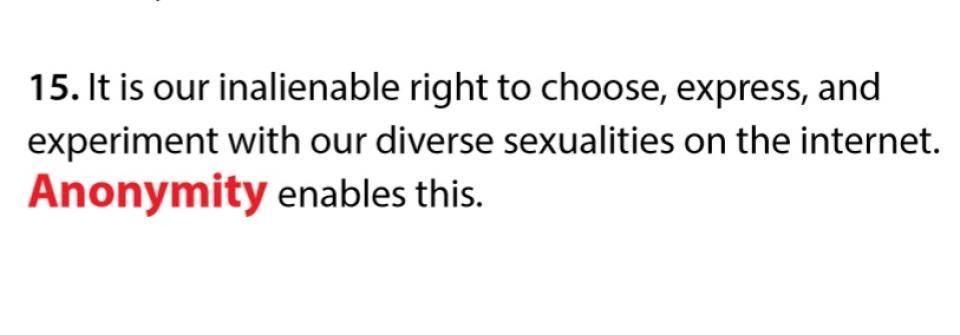
Since the Edward Snowden saga, a lot of focus has been geared towards individual privacy rights and ultimately to the fight against mass surveillance. In this ongoing attempt to create a better and safer internet, a critical and related discussion on anonymity has been largely side-stepped in terms of how de facto surveillance and identification largely affect women. Considered as one of the smaller problems compared to megalomaniac surveillance attempts from State leaders and agencies world over, anonymity is anything but a small problem.
If it weren’t for anonymity, Snowden would not have been able to whistle blow a crucial streak of leaks that could have changed the dynamic the internet in global and individual ways. Thus, the right to anonymity has to be equally protected to create a safe online space for not only whistle blowers but any individual. The gender perspective of anonymity, therefore, has to be equally considered during every debate around surveillance and/or anonymity as it is largely women who feel watched over. From being unable to explore their sexuality to searching for something private on Google, they often feel watched, with the fear that their searches will be publicized without consent.
A recent example of how digital surveillance has gendered impacts, the leaking of private photos of a number of high-profile celebrities like Jennifer Lawrence illustrates this clearly. In a world that is starkly gender-oriented, the leaking of private photos of male actors are rare, and would not have the same impact. It may come in the form of a tech-savvy hacker looking for a way to blackmail leading women or in the form of a government surveillance program, such as CCTV cameras on the roads, buses, and beaches as an anti-rape initiative, regardless the subject is more often than not a women and the watcher a man.
It is not government surveillance alone then that is responsible for conforming to the patriarchal norms of watching women. Individuals and private companies play an equal or bigger role. Surveillance and the required identification online, hence, become a default tool of patriarchy to control and restrict rights both online and offline, as mentioned in the Feminist Principles of the Internet.
While the debate around anonymity rarely gets seen from a feminist angle, women go through this feeling of being watched online and offline every day of their lives. It happens so often and so persistently that it has increasingly become synonymous to the experience of being a woman. It is no wonder then that the Feminists Principles of the Internet vocally advocate that “It is our inalienable right to choose, express, and experiment with our diverse sexualities on the internet. Anonymity enables this.”
However, with the right to anonymity and a relevant right to be forgotten (which requires its own space to be discussed) comes the tragic part of security and harassment under the wrap of anonymity. This complexity of creating an anonymous digital world while not enabling the harassers, hackers, or blackmailers is what makes the debate around anonymity important for internet governance.
Turkey hosted the 2014 Internet Governance Forum in Istanbul. The forum included a panel titled Anonymity by design: Protecting while connecting. A respected panel was selected which included individuals from academia like Meryem Marzouki, journalists (who more often than not need to be anonymous) like Serhat Ayan, and officials like Sophie Kwasny from Council of Europe. The younger demographic was represented by Harriet Kempson of Youth IGF Project.
The session was moderated by Marianne Franklin and Robert Bodle from Internet Rights and Principles Coalition. Other speakers included Nadine Moawad, APC’s EROTICS project coordinator, Charles McCathie Nevile (Yandex, Australia), Serhat Koc (Founding partner of Guneli & Koc Law Firm, member of Pirate Party of Turkey Movement, Turkey), Ismail Hakkı Polat (Kadir Has University, Department of New Media, Writer at Bloomberg Business Week, Turkey), and Ebru Yetiskin (Istanbul Technical University, Department of Sociology, Turkey).
Co-sponsored by the Internet Rights and Principles Coalition and the Pirate Party Movement of Turkey, this roundtable tried to tie earlier discussions from IGF 2013 in Bali and progress towards the development of a more secure online ecosystem. Robert Bodle of the IRP Coalition started the conversation with a coherent view of why anonymity was a basic right just as privacy and freedom of expression. As Bodle put it, a lack of anonymity and the state’s ability to regularly track human right defenders, activists or opposition members has a chilling effect on freedom of expression and individual privacy. He also argued that anonymity encourages people (especially the vulnerable and marginalized) to express themselves and participate without a fear of being watched and tracked.
The panelists analyzed how different levels of anonymity exist in our digital lives and how they could be broken to create solutions to the issue of providing the right to anonymity. For example, if agencies and governments want to use the tags of national security or public law and order, there is no reason to track what we are reading on our iBooks app. If the governments want to be able to track a social media user online who may have been responsible for some crime, the anonymity online could be broken down in small pieces to actually let a common individual feel safer online, rather than giving governments blanket approval to seize or monitor all internet traffic.
Harriet Kempson mentioned how people feel embarrassed when using online services for exploring sexuality or sexual health and how being anonymous helps in reaching out and seeking assistance in private areas of life. Nadine Moawad from APC discussed the relevance of these concerns to her work with APC’s EROTICS project and shared that, for the past two decades, sexual rights activism has largely depended on the internet. In response to a global survey, 98% of sexual rights activists, women’s rights activists, safe abortion activists, LBGTQ activists, sex education activists, and others responded that the internet is “absolutely crucial for sexual rights”.
It is thus not only women but other marginalized groups including non-heteronormative sexually orientated advocates and individuals who need anonymity and privacy. There have been more than a few cases where a specific group was targeted based on sexual orientation using the geolocation information; a particular case study being of Syria where gays were located and arrested.
Nadine also said that youngsters question sexuality more openly when they were able to do so anonymously using her website “Ask About It”. Although the majority of questions were posted by boys, girls also posted some questions. “It’s really important for kids to be able to ask questions and it’s impossible for kids to do that without anonymity. And what we see today with young people migrating away from Facebook, from sites that capture a lot of their data, from sites where they’re obliged to show their data and going more towards private communication on sites where they just – they don’t have to deal with their parents’ watching them or everybody watching them.”
Anonymity also helps combat sexual violence and discrimination. A survivor, for example, may never stand up and fight against the perpetrators for the reasons of security unless their identity is completely hidden. This can also lessen the impact of victim-blaming. No argument is created for the clothes, body shape, or cleavage of the victim if their identity is never disclosed to public.
Nadine also reiterated this essential prerequisite of anonymity for combating sexual violence, “We saw many such examples of women, especially young women who come out and talk about violence that’s happened to them in institutions, schools, universities, at their jobs, on the streets. Being able to be anonymous sort of takes away from who are you, what do you look like, how can I justify this violence that has happened to you? Are you too tall, are you too short, are you too skinny, too blond, I don’t know, what weren’t you wearing, et cetera. So being able to be anonymous helped in a lot of ways to put those experiences forward and multiply that sort of ‘let’s talk about the violence that happens’, let’s bring the sexuality out of the taboo and out of the private; into the public sphere.”
It is therefore important to give the handle and choice of being anonymous or not in the hands of the user. It should be her right to politicize, publicize, or remain private. As Bodle said, “we need to make anonymity the default and identification a choice.” The sword of always being watched and traced by someone has a detrimental effect on not only freedom of expression but privacy itself. It instills a growing sense of insecurity which curtails speech in a democratic setting and can worsen problems such as sexual violence and gender-based discrimination.
- 11464 views







Add new comment